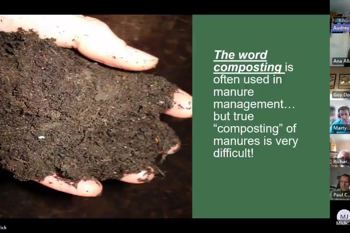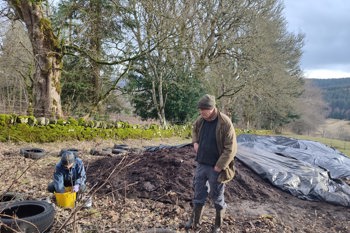
Bokashi is the Japanese word for “well-fermented organic matter”. Bokashi Manure Treatment is becoming increasingly popular, and involves microorganisms breaking down animal bedding and dung. It is said to have many benefits, including increased nutrient content of manure and animal welfare improvements. But there is no published work which has shown clear evidence of the benefits of Bokashi manures to UK farmers, crops, soils or the environment.
Two farmers in Scotland are running trials to evaluate the potential benefits of Bokashi manure treatment. As well as measuring the benefits, they are keen to trial the management process, and find out how easy it is to handle and spread the bokashi-treated manure compared with other manures, and to compare their carbon footprints.
Bokashi Manure Treatment is said to have a number of benefits, including:
The trials will take place on two farms over a three-year trial.
Discussions will also take place with other farmers and community farms in the Field Lab who will also be trialling the bokashi method, to draw on their experiences of using the process.
At Glen Fincastle, Andrew Barbour has taken some of the dung out of the shed, which has been sampled, tested and results returned. Andrew was pleased with the Bokashi and he and his wife Seonaid felt that the odours in the Bokashi-treated bedding were much less.
At Lochhill, very poor weather has caused a delay in removing dung from the housing to outdoor heaps.
Start of trial - Sampling of existing manures
Apply bokashi treatment to bedding
Remove manures from housing, cover and stack
Sample bokashi and non bokashi manures
Basic soil tests for chosen fields where manures will be spread
Application of manures
Sample and test manures after a 6-8 week treatment, prior to application
Apply manures to fields
Spray bedding for next year's trials
Repeat 2024 process
Basic soil tests
Final result analysis and report published

Earthcare Technical
Scotland
Audrey [BSc (Hons), PhD, MBPR (FACTS, Amenity)] has over 30 years’ experience as a crop and environmental scientist. She has held senior research posts at both Aberdeen University and SAC, where she worked in sustainable and organic crop production, crop nutrition and soil management. During the past 15 years she has specialised in soil assessment, soil management and the use of composts, digestates, fertilisers and other organic materials in agriculture, horticulture, landscaping and land restoration.

